A bottomless portafilter, also known as a naked portafilter, is an essential tool for any barista aiming to perfect their espresso-making skills. Unlike regular portafilters, which have a spout at the bottom, a bottomless portafilter exposes the entire basket, allowing you to observe the espresso extraction process in real time. This visibility helps diagnose and correct common issues such as channeling, uneven extraction, and improper tamping. By offering immediate feedback, bottomless portafilters enable baristas to make precise adjustments and consistently produce high-quality espresso shots.
Understanding the importance of a bottomless portafilter in achieving the perfect espresso shot can revolutionize your approach to coffee making. The three articles referenced in this guide provide a comprehensive overview of the benefits, comparisons, and practical applications of bottomless portafilters, making this guide your go-to resource for mastering this essential barista tool.
What is a Bottomless Portafilter?
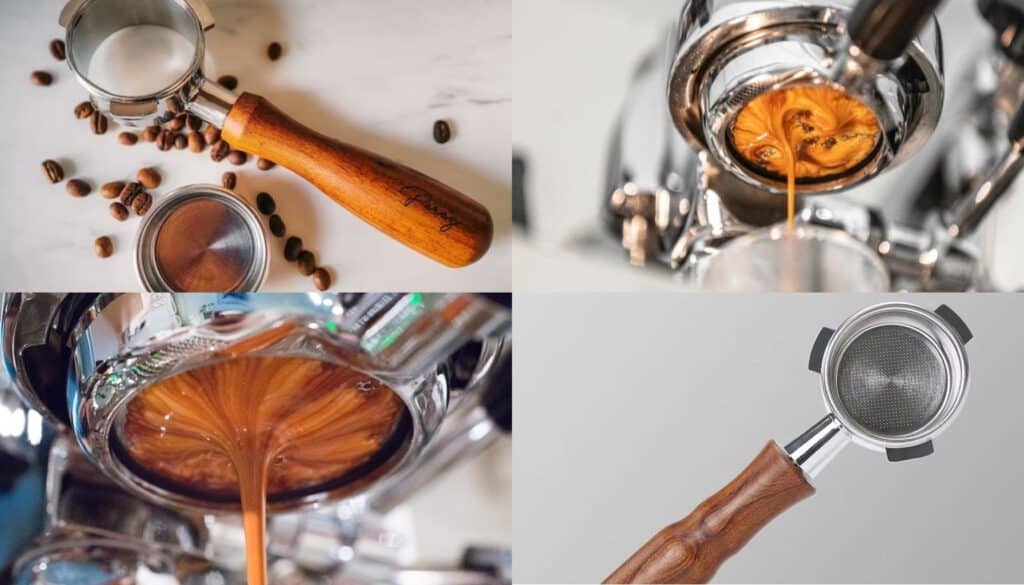
Definition and Characteristics
A bottomless portafilter, often referred to as a naked portafilter, is a type of portafilter used in espresso machines that lacks the spout found on regular portafilters. By removing the bottom section, the basket is fully exposed, allowing you to see the entire extraction process from start to finish. This unique design provides a clear, unobstructed view of how the espresso flows out of the basket, which is crucial for diagnosing and correcting extraction issues.
Bottomless portafilters are distinguished by their ability to showcase the nuances of espresso extraction. This visibility helps baristas understand the effects of their grind size, dosing, and tamping techniques on the final shot. When using a bottomless portafilter, you’ll notice the formation of “tiger stripes” or a uniform flow of espresso if everything is done correctly. Any inconsistencies, such as spurts or uneven flow, indicate areas that need improvement.
Visual and Practical Benefits
One of the most significant advantages of a bottomless portafilter is the immediate visual feedback it provides. By observing the extraction process, baristas can quickly identify and address issues such as channeling, which occurs when water finds a path of least resistance through the coffee grounds, leading to uneven extraction. This real-time troubleshooting helps improve the consistency and quality of espresso shots.
Additionally, the bottomless design enhances practical aspects of espresso making. Without the spout, there is less metal for the espresso to come into contact with, which can result in a cleaner, more flavorful shot. The absence of a spout also means more cup clearance, allowing baristas to extract espresso directly into a wider variety of cups and vessels. This flexibility is particularly useful in busy coffee shops where efficiency and speed are crucial.
Advantages of Using a Bottomless Portafilter
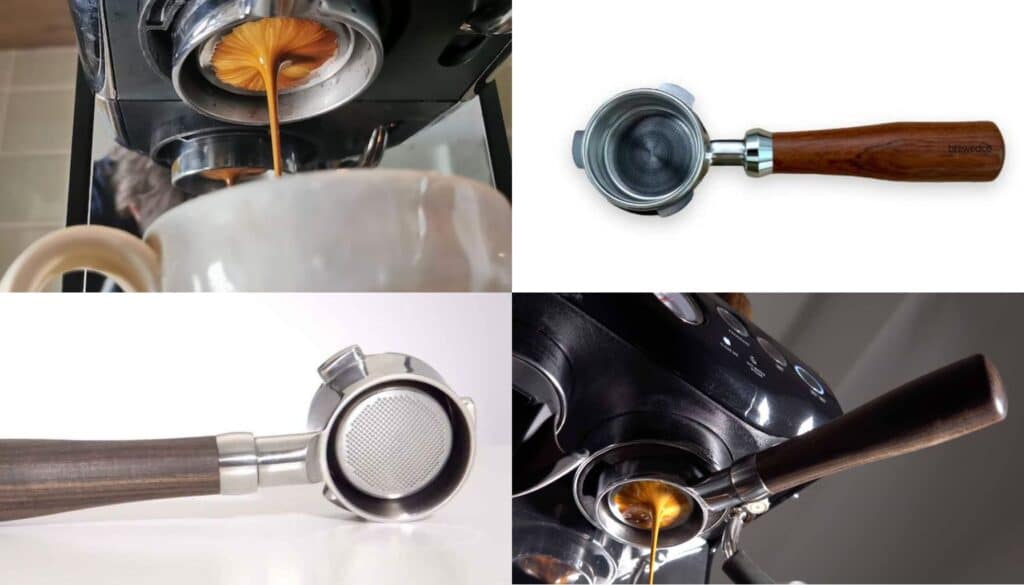
Consistency in Espresso Shots
Using a bottomless portafilter significantly enhances the consistency of your espresso shots. By providing a clear view of the extraction process, it allows you to troubleshoot and adjust your technique instantly. You can see if the coffee grounds are evenly distributed and if the tamping pressure is correct. This immediate feedback helps you make precise corrections, ensuring that each shot meets the highest standards. With regular use, you can develop a consistent technique that yields uniformly excellent espresso shots, giving you a competitive edge in the coffee industry.
Enhanced Crema Production
A bottomless portafilter can dramatically increase crema production, which is a key indicator of a well-extracted espresso. Since the espresso flows directly from the basket without coming into contact with any metal surfaces, the crema remains intact and abundant. This lack of contact preserves the tiny bubbles that form the crema, resulting in a richer, more visually appealing shot. Additionally, the absence of a spout provides more cup clearance, allowing for direct extraction into various cup sizes, enhancing both the presentation and the efficiency of your espresso-making process.
Improved Flavor
The use of a bottomless portafilter can lead to a noticeable improvement in the flavor of your espresso. More crema means more flavor compounds are preserved, leading to a richer, more complex taste profile. Additionally, with fewer metal surfaces for the espresso to contact, there is less risk of contamination from a dirty portafilter. This results in a cleaner taste, free from the off-flavors that can develop when espresso comes into contact with unclean surfaces. Regular cleaning of the basket is easier with a bottomless portafilter, ensuring that each shot is as fresh and flavorful as possible.
Troubleshooting Espresso Extraction
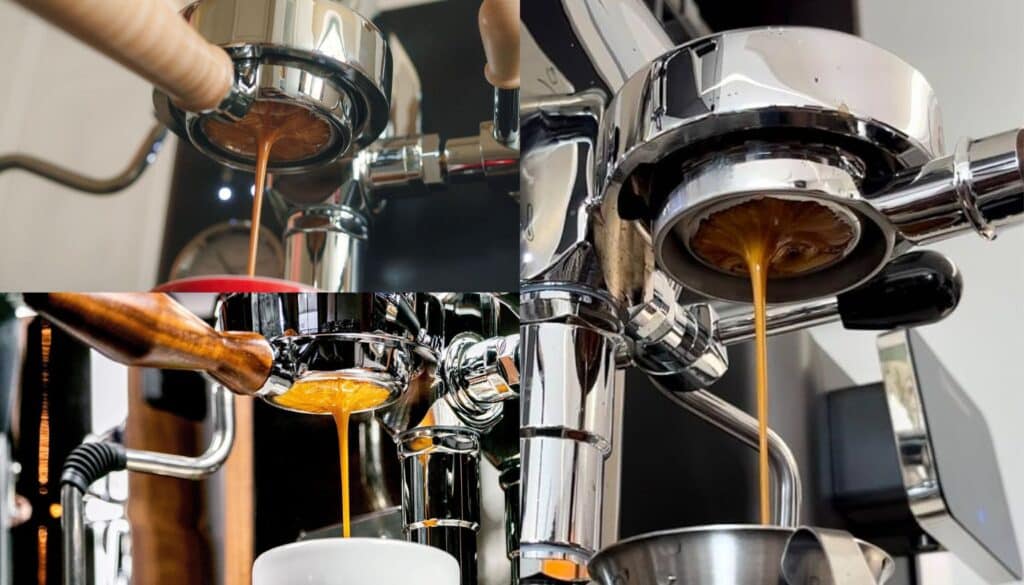
Identifying Common Issues
A bottomless portafilter is an invaluable tool for identifying and diagnosing common espresso extraction issues. When using this type of portafilter, you can observe the flow of espresso directly from the basket, making it easy to spot problems such as channeling and uneven extraction. Channeling occurs when water finds a path of least resistance through the coffee grounds, resulting in uneven extraction and poor flavor. With a bottomless portafilter, you can see if the espresso is flowing evenly or if there are rogue streams indicating areas where the grounds are not packed uniformly.
Uneven extraction can manifest as patches of dark and light crema, irregular flow patterns, or spurts of espresso. These signs indicate issues with your grind size, dosing, or tamping technique. By closely monitoring the extraction process, you can quickly identify these problems and make the necessary adjustments to improve the quality of your shots.
Adjusting Techniques
Once you identify extraction issues, you can adjust your techniques to achieve a more consistent and even flow. Start by ensuring that your grind size is appropriate for the espresso you are making. Too coarse a grind can result in under-extraction, while too fine a grind can cause over-extraction. Use a consistent dosing method to ensure that the same amount of coffee is used for each shot. This helps maintain uniformity in your extraction process.
Proper tamping is also crucial for an even extraction. Apply even pressure across the coffee grounds to create a level surface. If you notice that the extraction leans to one side or produces uneven streams, it could indicate that your tamping technique needs adjustment. Practice applying consistent pressure and ensuring that the tamper is level to avoid creating channels or unevenly packed grounds.
A clean filter basket is essential for accurate diagnosis and consistent results. Regularly check for and clean any coffee residue or blockages in the basket holes, as these can affect the flow and quality of your espresso. By maintaining a clean basket and making precise adjustments to your technique, you can achieve a more uniform and high-quality extraction.
Training Tool for Baristas
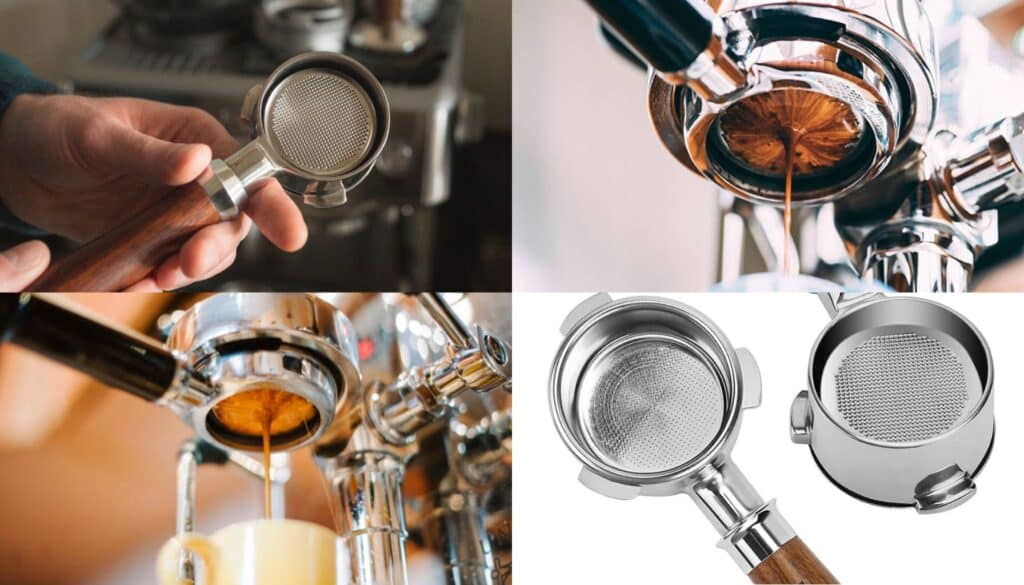
Educational Value
A bottomless portafilter serves as an excellent training tool for both novice and experienced baristas. Its transparent design provides immediate visual feedback, allowing baristas to see exactly how their tamping and dosing techniques affect the espresso extraction. This real-time insight is invaluable for learning and refining the skills necessary for producing high-quality espresso consistently.
For novice baristas, the bottomless portafilter offers a clear demonstration of the fundamental principles of espresso making. By observing the extraction process, they can understand the importance of even grind distribution, proper dosing, and precise tamping. This visual aid accelerates the learning curve, helping new baristas quickly grasp the nuances of espresso preparation.
Experienced baristas can also benefit from using a bottomless portafilter. It allows them to fine-tune their techniques, identify any inconsistencies, and perfect their skills. Even subtle issues in the extraction process become apparent with a bottomless portafilter, enabling seasoned professionals to achieve even greater precision and consistency in their shots.
Visible Feedback on Techniques
The bottomless portafilter provides clear and immediate feedback on various aspects of espresso preparation. When everything is done correctly, you will see a uniform flow of espresso, often referred to as “tiger stripes,” which indicates a balanced and even extraction. Any deviations from this ideal flow can reveal specific areas where adjustments are needed.
For instance, if the espresso sprays or comes out in uneven streams, it could indicate issues with tamping pressure or an uneven coffee bed. This feedback allows baristas to make precise adjustments, such as leveling the coffee bed more evenly or applying consistent tamping pressure, to improve their technique.
Additionally, the bottomless portafilter highlights the impact of grind size on extraction. By experimenting with different grind sizes and observing the results, baristas can better understand how to adjust their grinder settings to achieve the desired flow rate and flavor profile. This hands-on experimentation is crucial for mastering the art of espresso making.
Use in Training Programs
Many coffee shops and training programs incorporate bottomless portafilters into their barista training curriculum. These tools help trainees quickly identify and correct mistakes, leading to faster skill development and better overall performance. By using bottomless portafilters, training programs can ensure that baristas develop a solid foundation in espresso preparation and are well-equipped to deliver consistent, high-quality coffee.
Incorporating bottomless portafilters into training sessions also fosters a deeper understanding of the espresso-making process. Trainees can visually connect the theoretical aspects of dosing, tamping, and extraction with practical outcomes, reinforcing their learning and building confidence in their abilities.
Bottomless vs. Regular Portafilters
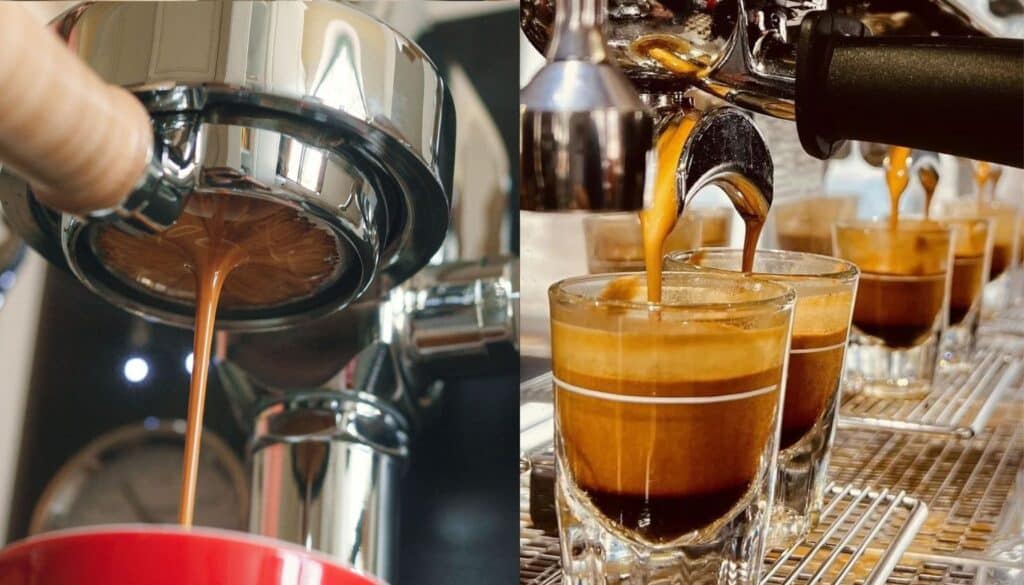
Comparison Overview
When choosing between a bottomless (naked) portafilter and a regular (spouted) portafilter, it’s important to understand their key differences and unique benefits. Regular portafilters have a solid bottom with one or two spouts that guide the espresso into the cup, while bottomless portafilters expose the entire basket, allowing you to see the extraction process.
Regular portafilters are commonly used in many coffee shops due to their straightforward design and ease of use. However, bottomless portafilters are increasingly popular among coffee enthusiasts and professional baristas for their diagnostic capabilities and ability to improve extraction techniques.
Pressure and Flavor Dynamics
One of the primary differences between bottomless and regular portafilters is the impact on pressure and flavor during extraction. Regular portafilters can handle higher pressure, which can result in a more robust brew with a stronger flavor. However, this increased pressure can also lead to higher moisture levels in the coffee, potentially diminishing some of the nuanced flavors.
In contrast, bottomless portafilters create less pressure during extraction, which can produce a milder flavor with more pronounced aromatic qualities. This lower pressure extraction is ideal for highlighting the subtle flavors and complexities of high-quality coffee beans. Experienced baristas can leverage this to produce a more refined and aromatic espresso, although it requires careful monitoring to avoid under-extraction.
Maintenance and Hygiene
Bottomless portafilters offer several advantages in terms of maintenance and hygiene. Without a solid bottom, they are easier to clean, as there are no spouts or crevices where coffee residue can accumulate. This ease of cleaning reduces the likelihood of bacteria and mold growth, ensuring that each shot of espresso is as fresh and clean as possible.
Regular portafilters, with their spouts and enclosed bottoms, require more thorough cleaning to remove coffee oils and residues that can affect the flavor of subsequent shots. Maintaining cleanliness is critical for both types of portafilters, but the simpler design of bottomless portafilters makes it easier to achieve and maintain a high standard of hygiene.
However, bottomless portafilters are more delicate and require careful handling. The exposed basket and metal grid can be easily damaged if not used and cleaned properly, which can affect the quality of the espresso. Regular portafilters are generally more robust and can withstand the rigors of a busy coffee shop environment.
Cost Implications
When considering cost, bottomless portafilters are generally more expensive than regular portafilters. The higher price is often justified by the superior quality of espresso they can help produce and their diagnostic benefits. For professional baristas and coffee enthusiasts who prioritize quality and precision, the investment in a bottomless portafilter can be worthwhile.
Regular portafilters are typically more affordable and widely available, making them a practical choice for many coffee shops and home baristas. They offer reliable performance and are suitable for producing consistent, everyday espresso shots.
Choosing the Right Portafilter
Ultimately, the choice between a bottomless and regular portafilter depends on your individual preferences, skill level, and the specific needs of the coffee you wish to prepare. If you value the ability to diagnose and refine your extraction technique, a bottomless portafilter is an excellent choice. It provides clear feedback and helps you achieve a higher level of precision in your espresso making.
On the other hand, if you prefer a more robust and straightforward tool that can handle higher pressure and is less delicate, a regular portafilter might be the better option. It offers consistency and durability, making it suitable for high-volume environments.
Practical Considerations
Choosing the Right Portafilter
Selecting the right portafilter depends on your specific needs, preferences, and the type of espresso you want to create. A bottomless portafilter is ideal for baristas who want to refine their technique and achieve the highest quality shots. Its design allows for real-time feedback, helping you identify and correct issues with grind size, dosing, and tamping. This makes it a valuable tool for those who are passionate about perfecting their espresso-making skills.
Regular portafilters, with their spouts and enclosed design, are more suited for high-volume environments where consistency and durability are key. They can handle higher pressure, producing a robust espresso shot, and are generally more forgiving of minor errors in technique. This makes them a practical choice for busy coffee shops or home baristas who prefer a straightforward approach to espresso making.
Importance of Maintaining Cleanliness and Hygiene
Regardless of the type of portafilter you choose, maintaining cleanliness and hygiene is crucial for producing high-quality espresso. Bottomless portafilters are easier to clean because they lack the spouts and enclosed spaces where coffee residues can accumulate. This reduces the risk of contamination and ensures that each shot is fresh and flavorful.
Regular portafilters require more thorough cleaning due to their more complex design. It’s essential to regularly clean the spouts and enclosed bottom to prevent the buildup of coffee oils and residues, which can affect the taste of your espresso. Using a brush and a dedicated cleaning solution can help maintain the portafilter’s hygiene and performance.
Cost Implications
When it comes to cost, bottomless portafilters are generally more expensive than their regular counterparts. This higher price can be justified by the superior quality of espresso they help produce and their diagnostic benefits. For professional baristas and serious coffee enthusiasts, the investment in a bottomless portafilter can lead to significant improvements in espresso quality and consistency.
Regular portafilters are typically more affordable and are a practical choice for those on a budget or who need a reliable tool for everyday use. They offer a good balance of performance and durability, making them suitable for both commercial and home use.
By carefully considering your needs, budget, and the specific requirements of your espresso-making process, you can choose the portafilter that best suits your goals. Whether you opt for a bottomless or regular portafilter, maintaining cleanliness and proper technique will ensure that you consistently produce excellent espresso.
Conclusion
Summary of Key Points
In summary, bottomless portafilters offer a range of benefits that can significantly enhance your espresso-making experience. They provide immediate visual feedback, helping you identify and correct issues with grind size, dosing, and tamping. This leads to more consistent and higher quality espresso shots. The enhanced crema production and improved flavor are notable advantages that can elevate the overall coffee experience. Additionally, bottomless portafilters serve as excellent training tools for both novice and experienced baristas, making them invaluable in refining espresso-making techniques.
On the other hand, regular portafilters are robust, handle higher pressure, and are generally more straightforward to use, making them suitable for high-volume environments. They offer reliable performance and are easier to maintain in busy coffee shops or for everyday home use. Both types have their unique advantages and are chosen based on individual preferences and specific needs.
Final Thoughts
Choosing between a bottomless and regular portafilter ultimately depends on your goals and priorities as a barista. If you are passionate about perfecting your technique and achieving the best possible espresso quality, investing in a bottomless portafilter is a wise choice. It provides invaluable insights into the extraction process and helps you fine-tune your skills to consistently produce excellent shots.
If you prefer a more practical and durable tool for everyday use, a regular portafilter might be the better option. It offers ease of use and reliability, making it a great choice for busy environments where consistency is key.
Regardless of your choice, maintaining cleanliness and proper technique is essential for producing high-quality espresso. Regular cleaning and attention to detail will ensure that your portafilter performs optimally and that each shot of espresso is as fresh and flavorful as possible.
By understanding the unique benefits and practical considerations of each type of portafilter, you can make an informed decision that enhances your espresso-making journey and delivers exceptional coffee experiences for you and your customers.






